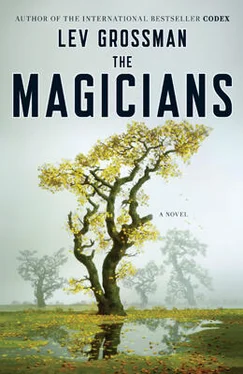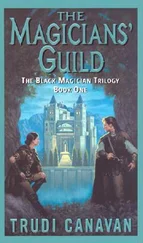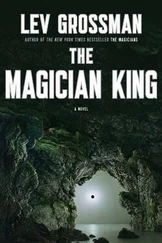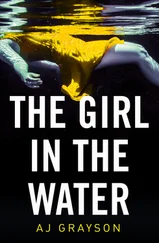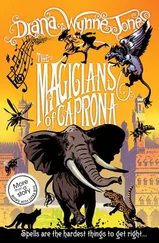It all felt like a dream now, though of course the first thing Quentin did that morning was check out his back in the mirror. There it was, a huge five-pointed star in thick black outline, raw and red and slightly off center to the left; he supposed it must be positioned more or less exactly with his heart at its center. Segments of the star were dense with fine squiggly black writing and smaller stars and crescent moons and other less easily identifiable icons — he looked like he hadn’t been so much tattooed as notarized, or stamped like a passport. Tired, achy, and hungover as he was, he smiled at it in the mirror. The overall effect was completely badass.
When it was all over, they shuffled out of the auditorium into the old hallway. If they’d had caps, they might have thrown them in the air, but they didn’t. There was a low hum of conversation, a couple of whoops, but that was really it; it was over, there was nothing else. If they hadn’t been graduated last night, they sure were now. They could go anywhere, do anything they wanted. This was it: the big send-off.
Alice and Quentin drifted out a side door and wandered over to a huge spreading oak, swinging their held hands between them. There was no wind. The sunlight was too bright. Quentin’s head throbbed. His parents were in the vicinity, and he’d have to go look for them in a second. Or maybe they could come looking for him for once in their lives. There would be parties tonight, he supposed, but he was already pretty much partied out. He didn’t feel like packing up his things, didn’t feel like going back to Chesterton, or Brooklyn, or anywhere else for that matter. He didn’t feel like staying, and he didn’t feel like going. He stole a glance at Alice. She looked peaked. He performed a mental search for the love he was accustomed to feel for her and found it strangely absent. If there was anything he wanted at that moment it was to be alone. But he wasn’t going to get that.
These were bad thoughts, but he couldn’t or wouldn’t stop the flow, stanch the cerebral hemorrhage. Here he was, a freshly licensed and bonded and accredited magician. He had learned to cast spells, seen the Beast and lived, flown to Antarctica on his own two wings, and returned naked by the sheer force of his magical will. He had an iron demon in his back. Who would ever have thought he could do and have and be all those things and still feel nothing at all? What was he missing? Or was it him? If he wasn’t happy even here, even now, did the flaw lie in him? As soon as he seized happiness it dispersed and reappeared somewhere else. Like Fillory, like everything good, it never lasted. What a terrible thing to know.
I got my heart’s desire, he thought, and there my troubles began.
“We have our whole lives ahead of us and all I want to do is take a nap,” Alice said.
There was a soft sound behind them. A soap bubble popping, an intake of breath, a wing beat.
Quentin turned around, and they were all there. Josh with a fringe of blond beard that made him look more than ever like a genial smiling abbot. Janet had gotten her nose pierced, and probably other parts of her. Eliot wore sunglasses, which he had never done at Brakebills, and a shirt of amazing, indescribable perfection. There was somebody else with them, too, a stranger: a serious, slightly older man, tall and darkly, bookishly handsome.
“Get your stuff together,” Josh said. He grinned even more widely and spread out his arms like a prophet. “We’re going to take you away from all this.”
Two months later it was November. Not Brakebills November, real November — Quentin had to keep reminding himself that they were on regular real-world time now. He lolled his temple against the cold apartment window. Far below he could see a neat little rectangular park where the trees were red and brown. The grass was threadbare, with dirt patches, like a worn-out rug with the canvas backing showing through the woven surface.
Quentin and Alice lay on their backs on a wide, candy-striped daybed by the window, limply holding hands, looking and feeling like they’d just washed ashore on a raft that had been gently, limply deposited by the surf on the beach of a silent deserted island. The lights were off, but milky-white afternoon sunlight filtered into the room through half-closed blinds. The remains of a game of chess, a sloppy, murderous draw, lay on a nearby coffee table.
The apartment was undecorated and barely furnished except for an eclectic collection they’d trucked in as the need arose. They were squatting: a tiresomely complex magical arrangement had allowed them to secure this particular scrap of underutilized Lower East Side real estate while its rightful owners were otherwise occupied.
A deep, thick silence hung in the still air, like stiff white sheets on a clothesline. Nobody spoke, and nobody had spoken for about an hour, and nobody felt the need to speak. They were in lotus-land.
“What time is it?” Alice said finally.
“Two. Past two.” Quentin turned his head to look at the clock. “Two.”
The buzzer rang. Neither of them moved.
“It’s probably Eliot,” Quentin said.
“Are you going over early?”
“Yes. Probably.”
“You didn’t tell me you were going early.”
Quentin sat up slowly, using just his stomach muscles, at the same time extracting his arm from beneath Alice’s head.
“I’m probably going early.”
He buzzed Eliot in. They were going to a party.
It was only two months since graduation, but already Brakebills seemed like a lifetime ago — yet another lifetime, Quentin thought, reflecting world-wearily that at the age of twenty-one he was already on his third or fourth lifetime.
When he left Brakebills for New York, Quentin had expected to be knocked down and ravished by the sheer gritty reality of it all: going from the jeweled chrysalis of Brakebills to the big, messy, dirty city, where real people led real lives in the real world and did real work for real money. And for a couple of weeks he had been. It was definitely real, if by real you meant non-magical and obsessed with money and amazingly filthy. He had completely forgotten what it was like to be in the mundane world all the time. Nothing was enchanted: everything was what it was and nothing more. Every conceivable surface was plastered with words — concert posters, billboards, graffiti, maps, signs, warning labels, alternate-side parking regulations — but none of it meant anything, not the way a spell did. At Brakebills every square inch of the House, every brick, every bush, every tree, had been marinated in magic for centuries. Here, out in the world, raw unmodified physics reigned, and mundanity was epidemic. It was like a coral reef with the living vital meaning bleached out of it, leaving nothing but an empty colored rock behind. To a magician’s eyes, Manhattan looked like a desert.
Though like a desert, it did have some stunted, twisted traces of life, if you dug for them. There was a magical culture in New York outside the handful of Brakebills-educated elite who resided there, but it existed on the city’s immigrant margins. The older Physical Kids — a name they had left behind at Brakebills and would never use again — gave Quentin and Alice the outer-borough subway tour. In a windowless second-story café on Queens Boulevard, they watched Kazakhs and Hasidim construe number theory. They ate dumplings with Korean mystics in Flushing and watched modern-day Isis worshippers rehearse Egyptian street hexes in the back of a bodega on Atlantic Avenue. Once they took the ferry across to Staten Island, where they stood around a dazzlingly blue swimming pool sipping gin and tonics at a conclave of Filipino shamans.
Читать дальше
